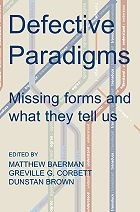A typology of defectiveness
Project Overview
Project
A typology of defectiveness
Project members:
Prof Greville G. Corbett
Dr Dunstan Brown
Dr Matthew Baerman
Period of award
September 2006 - February 2009
Funder:
Arts and Humanities Research Council (AHRC)
The term 'defectiveness' refers to gaps in inflectional paradigms — specifically, gaps which do not appear to follow from natural restrictions imposed by meaning or function. The Latin noun for 'change' is a textbook example: bizarrely, it lacks nominative and dative singular forms, and has no genitive plural:
| Singular | Plural | |
|---|---|---|
| Nominative | ------- | vicēs |
| Accusative | vicem | vicēs |
| Genitive | vicis | ------- |
| Dative | ------- | vicibus |
| Ablative | vice | vicibus |
Table 1. Defective paradigm of the Latin noun for 'change'
The fact that inflectional paradigms may have such anomalous gaps in them has been known since at least the days of the classical grammarians, but now as then, we understand little about them. And though the existence of defective paradigms is indisputable, few people could name more than a handful of examples. This project aimed to expand our empirical knowledge of this intriguing phenomenon and to clarify its significance for the study of language.



